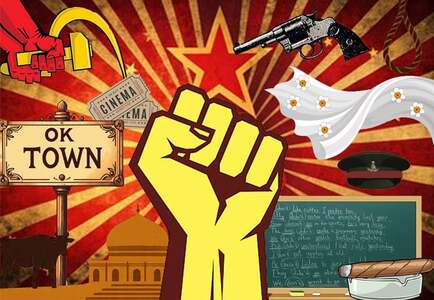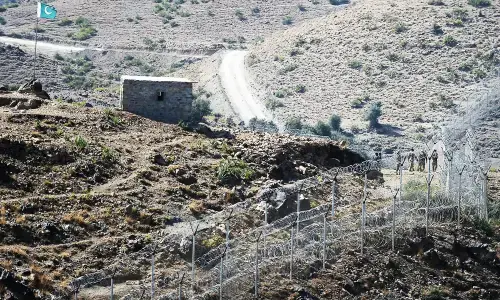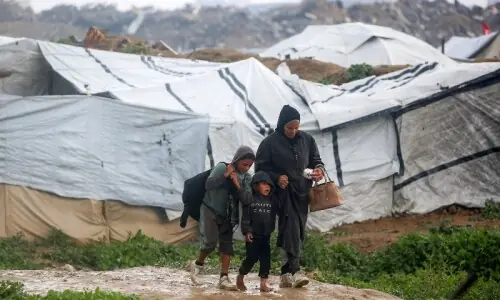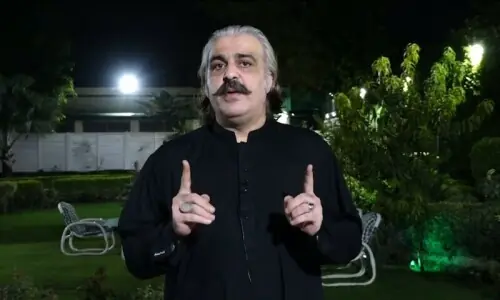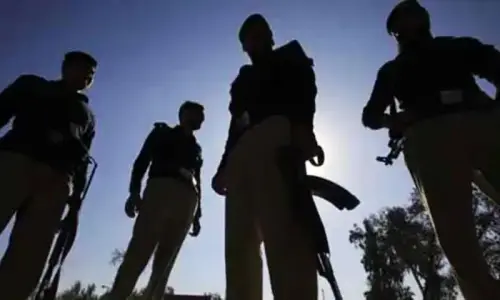Every year on November 1, the region of Gilgit-Baltistan (GB) officially celebrates its independence from Kashmir’s Dogra family rule. Gilgit was liberated on November 1, 1947 while Baltistan was freed in 1948 as a result of a bloody freedom war.
Despite protestations from India and even some Kashmiris, and despite Gilgit Baltistan existing in Pakistani maps as a part of a territory whose status has yet to be determined, the people of GB have never accepted being part of the disputed state of Jammu and Kashmir, over which Pakistan and India have been at loggerheads since Independence in 1947. It is instructive to look back at history to understand why.
Before its independence, present-day GB was part of the State of Jammu and Kashmir, one of the largest princely states of India. This state was created in 1846 after the signing of a treaty between the British and Gulab Singh of the Dogra dynasty.
During the first Anglo-Sikh war (1845-1846), Gulab Singh, who was serving as the ruler of Jammu in the Sikh empire, chose to side with the British East India Company by remaining neutral. Acknowledging Singh’s loyalty during the war, in 1846, the East India Company sold Kashmir to him for 7.5 million rupees of that time. With this accord, Gulab Singh eventually became the first Maharaja of Jammu and Kashmir.
The princely state of Jammu and Kashmir had four units: the province of Jammu, the province of Kashmir, the district of Gilgit and the district of Ladakh. Present-day Baltistan was subjugated and annexed by Gulab Singh’s Dogra army earlier, in 1840, before the Treaty of Amritsar. In the new administrative set-up, Baltistan was made part of district Ladakh as Skardu tehsil.

British and Dogra rule
Realising the geostrategic importance of this region, and fearing a possible Russian invasion from Central Asia, the British directly intervened and created the ‘Gilgit Agency’ in order to bring the area under their control. This marked the beginning of a dual British-Dogra control in Gilgit. Civil administration remained with Dogra rulers, while military and security matters were placed directly under the control of the British Indian Government.
The main aim of the British Indian Empire was to protect its northern border. A local paramilitary force — trained, equipped and led by the British — was formed and given the name of Gilgit Scouts. In 1935, the British took over the administration of Gilgit Agency from the Dogra ruler under a 60-year lease. However, the Baltistan region remained under the direct rule of the Dogras.
Two weeks before the independence of India and Pakistan, the British abruptly cancelled the lease. On July 30, 1947, the British commander-in-chief of the Kashmir army, Major Gen Scott arrived in Gilgit. He was accompanied by Brigadier Ghansara Singh, who had been sent to Gilgit by the Maharaja of Kashmir as a governor. The British offered the State of Jammu and Kashmir to take over Gilgit, as per the lease deed. On August 1, Brig Ghansara Singh took charge of the Gilgit Agency from the British Political Agent, Col Roger Bacon. The Union Jack was removed and the region fell under the control of the Maharaja.
November 1 is celebrated as an independence day in Gilgit-Baltistan, even though it officially remains part of the unresolved dispute between Pakistan and India over Kashmir. Recent announcements by Pakistan to attempt an integration of the area as a province have predictably set off opposition from India. But there is a history to why the people of the region do not accept themselves as part of the Kashmir dispute
The abrupt cancellation of the lease by Lord Mountbatten and the transfer of power to the Dogras left the Gilgit Scouts concerned about their status. With the arrival of Ghansara Singh, rumours started circulating that the Gilgit Scouts were to be replaced by the Kashmir army. The Scouts were clearly against the takeover by Kashmiri troops.
Serving in the Gilgit Scouts was considered a privilege among the local people. Usman Ali narrates in his book Gilgit Ka Inqilab [The Revolution of Gilgit] that, in this uncertain situation, Subedar Major Babar Khan, representing the Scouts, presented a set of demands to Ghansara Singh. The application, addressed to the Maharaja of Kashmir, included demands to elevate the status of the Gilgit Scouts, bringing it at par with the Kashmir state army; providing the Scouts similar training as that given to the state troops; bringing the salaries and facilities of the Scouts to match those of the state’s army; and increasing the number of Scouts. Sub Maj Babar pledged loyalty of the Scouts to the Maharaja if these demands were met. By that time, the Maharaja had not decided on Kashmir’s accession to either Pakistan or India. However, Sub Maj Babar’s surety meant that the Scouts would remain loyal to the Maharaja, in either case.

Revolt Against the Maharaja and Accession to Pakistan
Before and during Dogra rule, the regions of Gilgit and Baltistan were divided between small kingdoms which were ruled by rajas and mirs (local rulers). Though there was dual administrative control of the British and the Dogra dynasty over Gilgit Agency, the rajas and mirs enjoyed considerable autonomy in their own territories. In the Scouts, officers’ ranks were awarded to the ruling elites of these kingdoms, which made the Scouts a strong voice and an actor in the future settlement of this region. However, in the wake of the British departure from the Subcontinent and independence of Pakistan and India, the Gilgit Scouts showed opposition to the new ruler of the Agency as they were uncertain about their status.
With the end of British rule in sight, uprisings began against the Maharaja in different parts of Kashmir. Amid fear of Muslim uprisings in Kashmir and the rebels’ advance, the Maharaja, on October 27, 1947, declared the accession of Kashmir to India. After accession, Gilgit was caught in an uncertain situation about its future. The Gilgit Scouts, who had already formed a Revolutionary Council, initiated a revolt against Dogra rule on October 31, 1947. The Kashmiri troops were stationed in Bunji, an area near Gilgit, which was the garrison of the Maharaja’s army. The Muslim soldiers of the army led by Mirza Hasan Khan attacked the Sikh companies at Bunji, who then fled from the mountains towards Rondu in Baltistan.
Governor Ghansara Singh surrendered to Sub Maj Babar after some resistance. As a result of this revolt, the areas surrounding Gilgit were liberated from Dogra rule. An independent state, the ‘Islamic Republic of Gilgit’, was declared on November 1, 1947, and a provisional government was formed in Gilgit. The revolutionary government designated Raja Shah Raees Khan of Gilgit as president, and Col Mirza Hasan Khan as the chief of the armed forces. After 15 days of independence, Gilgit acceded to Pakistan unconditionally. On November 16, 1947, the representative of the Government of Pakistan, Sardar Mohammad Alam Khan, arrived in Gilgit and took charge as the Political Agent.
Meanwhile, the Raja of Rondu, Mohammad Ali Khan, organised the populace with meager resources to fight against the Sikh troops who had reached there. Numerous troops were killed in the battle, and many were arrested and sent to Gilgit. The Raja of Rondu later wrote a letter and invited the Gilgit Scouts to liberate Baltistan from Dogra Raj, as there was no organised local force in the area.

In Baltistan, the local people fought alongside the Scouts, for nearly a year, against the Kashmir army and paid a heavy toll in casualties. As Afzal Ali Shigri, former IGP Sindh who hails from GB, wrote in a column in daily Dawn (December 21, 2018), independence was achieved “through brutal running battles by a handful of mostly civilian fighters led by the Gilgit Scouts, against the forces of Kashmir.”
After the unconditional accession of the region to Pakistan, instead of devising a proper governance and administrative structure, the Government of Pakistan imposed the Frontier Crimes Regulation (FCR) in the area. FCR, a colonial law, deprived people of their basic rights and gave the Political Agent — a civil servant — supreme authority, with executive, legislative and judicial powers. Furthermore, despite Pakistan’s annexation of Gilgit and later Baltistan, the despotic rajgiri (principality) and jagirdari (feudal) system was not abolished. The exploitative practices of taxation and begaar (forced labour without pay) by the rajas and mirs continued.
Uncertain States
The question of how to deal with GB remained a problem for the state in the initial years. GB was deprived of administrative powers and governed by the bureaucracy and federal ministry. Nosheen Ali, in her book Delusional States, maintains that, although the political leadership of Pakistan had accepted the accession, Pakistan fell short of formally incorporating GB into its territory, primarily because of the contest with India over the control of Jammu and Kashmir. Consequently, the Government of Pakistan linked GB with Kashmir in anticipation of gaining more votes in a possible United Nations’ plebiscite for the resolution of the Kashmir dispute.

Due to this linkage, the region still has the status of a disputed territory. Subsequently, the region is in constitutional limbo and denied representation in the national legislature. Successive governments have tried to regulate the problems and solve the puzzle through different measures; however, the anomaly still exists. The question of GB’s integration into Pakistan is complicated as Pakistan and India both maintain GB is part of Kashmir. When India raised the case of Kashmir before the UN, India’s claim on Kashmir was denied and the whole state of Kashmir — including GB — became a disputed territory. The issue was supposed to be resolved through a plebiscite with certain preconditions.
GB’s scholars and political analysts take a contrary position. As per historical accounts, Kashmir’s Dogras captured Baltistan through military aggression; there was no legal or constitutional rationale for their rule. The people never accepted their rule, either. Hence, the occupation of the region through military invasion cannot justify associating the region with Kashmir.
Qasim Naseem, a senior journalist and writer from GB, argues that, if the justification behind declaring GB a part of Kashmir is accepted, Pakistan and India could also be declared a constitutional part of Britain. Kashmir itself was, at one time, ruled by Sultan Saeed Khan Kashgiri and came under control of the Afghans for a long period. However, Kashmir neither became part of Kashgar nor of Afghanistan. Naseem further contends that we do not accept Indian Occupied Kashmir as a part of India, despite it being under Indian administration since 1948.

The Future of GB
What makes GB’s conundrum intricate is that, despite 73 years of independence, it is still unable to achieve what it strove for. Every year, people of GB celebrate their independence with great zeal. However, the struggle to integrate the region in Pakistan continues.
Various governments in Pakistan have tried in the past to regulate the issues of GB through reforms and executive orders. Recently, the region has come under the spotlight again when the federal government announced plans to give GB provincial status. It seemed GB was finally on the path of integration with Pakistan. However, the important question remains whether the Government of Pakistan can take this bold step and, instead of another executive order, bring GB into the ambit of Pakistan’s constitution.
In an interview with Indian media earlier this month, the prime minister’s aide on national security Moeed Yusuf was asked by Indian journalist Karan Thapar about the PTI government’s decision to confer provincial status on GB. While reiterating that GB would “be included in the plebiscite the day the plebiscite happens”, Yusuf clarified, ‘One, no decision has been made; two, there is a public debate — the public debate is not being generated by the Government of Pakistan, it’s being generated by the people of Gilgit Baltistan. They’ve been saying this for two or three years now. What are they saying? ‘We want to be fully integrated with Pakistan.’”
In fact, that struggle of GB for its rights and integration is decades long.
The writer teaches at the Social Sciences and Liberal Arts department of IBA and is author of The Gilgit-Baltistan Conundrum: Dilemmas of Political Integration. He tweets @saj_ahmd
Published in Dawn, EOS, November 1st, 2020


